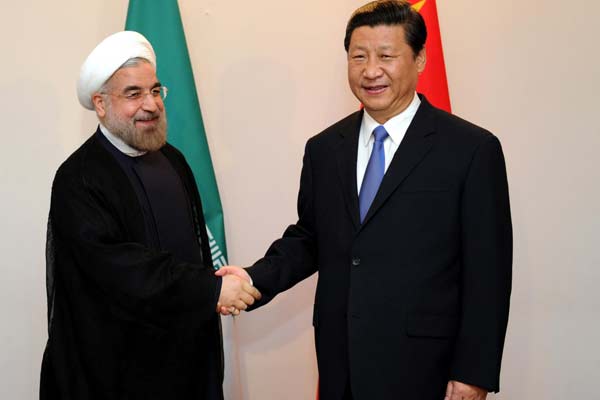Is China blocking Iranian nuclear negotiations?
- By Jin Liangxiang
 0 Comment(s)
0 Comment(s) Print
Print E-mail China.org.cn, December 28, 2014
E-mail China.org.cn, December 28, 2014
|
|
|
President Xi Jinping meets with his Iranian counterpart Hassan Rouhani in Bishkek, capital of Kyrgyzstan, on Sep 12, 2013. Xi said he supports Iran's proposal for renewed negotiations on its nuclear program and its peaceful use of nuclear energy. [Xinhua photo] |
It is widely accepted that China has been promoting the Iran nuclear negotiation since the very beginning. But during our latest visit to Tehran in December 2014, all delegation members, including myself, were shocked by a point of view held by our Iranian interlocutors. Instead of praising China's role in the negotiation, they argued that it was China that was blocking progress. We are told that such an opinion is very popular in Iran among ordinary people and among elite circles.
By talking with our Iranian colleagues, we understand that this argument is actually based on the wrong logic and rationale, that is, China's booming economic relations with Iran and the success of Chinese companies in Iran are because of U.S.-Iran hostility or the hostility between Iran and the West at large. It is because of the hostility that Chinese companies have been able to take the advantage of the West's absence.
It might be true that some Chinese companies, which are less competitive than Western companies, especially those with no advanced technologies, did benefit from the absence of Western companies. But that is only a small part of the story. The U.S. absence as a result of its hostilities has never been a major factor behind the rise of China's external economic relations.
China has become number two in the world in terms of total GDP in the world, second only to the United States and number one in total trade volume. Is it because of the West's absence as a result of U.S. hostility toward all other parts of the world? China has also become a major economic partner of Israel and European countries. But is the United States hostile to Israel and European countries? And China has also become a major partner of the United States. Does this logic offer an explanation?
China's commercial success lies in its own economic competitiveness rather than the absence of the United States or the West, the complementary nature of their economies, and also China-Iran friendship to some degree. China's business success in Iran is no different from that in other parts of the world.
China's success in international trade and other aspects of external economic relations suggests that China's economic capability is strong and Chinese companies are competitive enough. The reasons actually range from the low cost of labor to the hardworking nature of the government, the right government policy and even labor division as a result of globalization.






